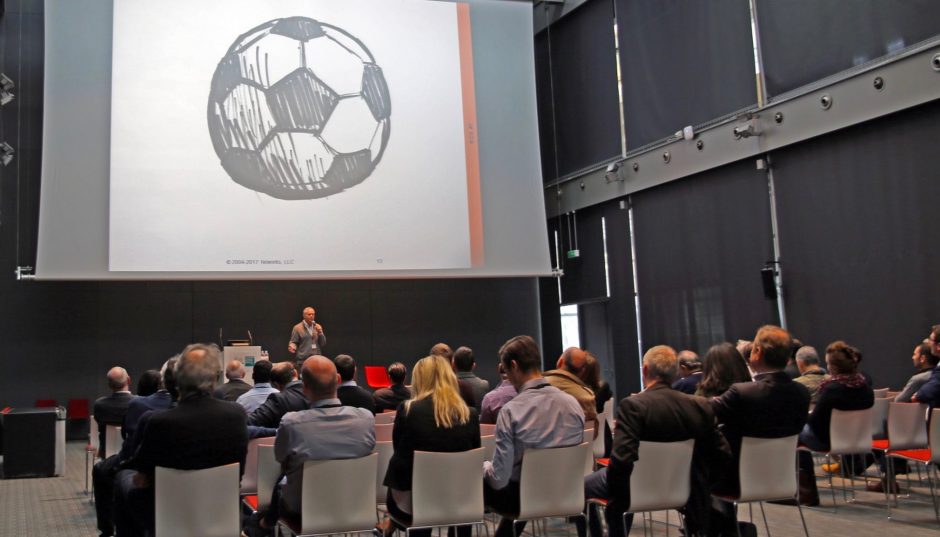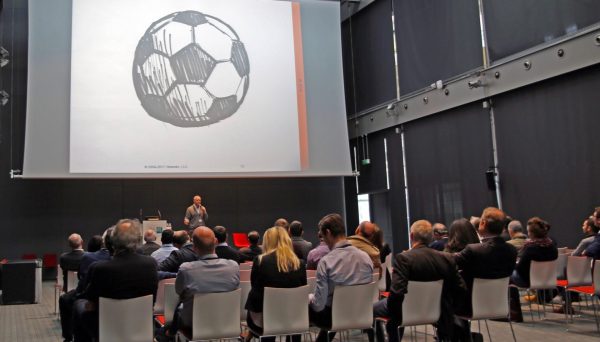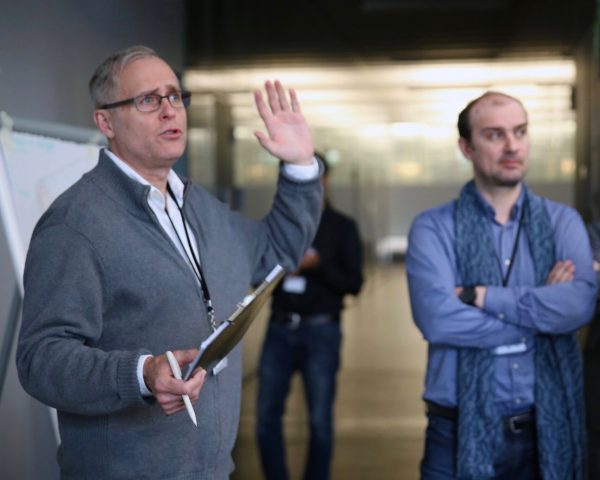Swiss Company Maker

Around twenty future entrepreneurs had been selected by the SwissCompanyMaker to participate in a workshop (supported partly by NCCR PlanetS) on the possibility of turning an idea into viable businesses. Assisted by professional coaches, they spent two days trying to identify and overcome the obstacles on the road to success.

Presenting the product that the candidate wants to sell: the football. (Photo: Pierre Bratschi)
“Are you an entrepreneur? “”Why buy your product rather than one from the competition? “”What solution to what problem do you bring?”. Questions, and many others, that each entrepreneur should ask themselves before starting their start-up. The American Mark W. Wilson imagined a workshop some fifteen years ago to help future industrialists overcome the difficulties that await them.
The workshop begins with the choice of candidates (the “champions” for Mark Wilson), the Consortium and Mark Wilson evaluated them according to three cuts. First, the proposed idea, its technological value, its degree of maturity and what the workshop could bring to the project. The second topic of the assessment concerns the candidate, his or her enthusiasm, the existence of a team and the level of knowledge in marketing/entrepreneurship. A telephone interview was also conducted. And finally more generally, if there is a good representation of the various Swiss institutions.
Each candidate was supported by a team that included a coach, a business expert, a technology transfer expert, and possibly an intellectual property specialist. During the workshop, the candidates had to carry out fifteen slides explaining their project, each one tackling a well-defined theme, such as “define your product”, “are you going to solve a major problem”, ” who are your competitors” or “what are the potential revenues “. Each of these themes was discussed for an hour with the team in order to identify a project whose importance, complexity and difficulty may have been underestimated by the candidate.

Mark Wilson (left) invented the workshop. (Photo: Pierre Bratschi)
This was the case for Reza, who would like to market a much faster algorithm than the existing ones in order to evaluate the risks of earthquakes caused by deep geothermal drilling. Indeed, since the micro-earthquakes triggered by geothermal drilling in Basel 10 years ago, all deep geothermal activity is halted in Switzerland. Reza believes that if his company had existed at the time, the accident would not have occurred and geothermal energy would be booming in Switzerland. After discussion it turned out that he was not alone in the market, that the Swiss market was not as large as he thought and that to be profitable and attractive he had more interest to offer a service of expertise rather than the software product alone. The discussions were lively and the points of view of each member of the team were instructive. As was the case when the lawyer asked him who owned the product, because if everything seems to be shared at first, things get complicated if the project is successful.
By the end of the day the candidates had gained a better idea of the challenges that awaited them. They then had a week to produce the 15 slides related to their project that they were going to present to their team. All the teams therefore found themselves the following week reviewing the slides of the champion one by one, questioning them, and correcting them for the final presentation. After discussions, sometimes passionate, the champion and their team were led to make an assessment that could surprise, encourage or disappoint. Indeed some had discovered hopes of development and unsuspected gains while others realized that their project was unlikely to succeed and simply gave-up. “It’s probably better that way,” says Mark, “I prefer a candidate to realize that the project is unsustainable rather than disillusionment later.”
This workshop was organized by the NCCR Chemical Biology. The next workshop will take place next year in Berne on the 17th, 18th and 25th of April and will be under the responsibility of the NCCR PlanetS. Enthusiasts take note!
Categories: Internal Newsletter
